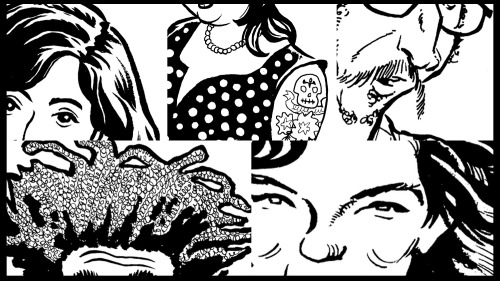*NOTE: This article contains foul language and pretentiousness. Proceed with caution.
Prelude
Quick Links:
Stroy Moyd | Jessica Sele | Lydia Popovich | Kate Willett | Matt Lieb
I didn’t anticipate how this would take, of my time, of my mind, of me. That’s why completing it is so rewarding. It’s 4:30am on 8/19. I began this 11:33am on 6/29. Untold hours of staring at a screen in a perfectionist dread, desperate to be more articulate than “Stroy’s cool”, “Lydia’s a boss”, “Kate’s driven”, “Jessica’s empathic”, “Matt’s heady”, etc.; days of writer’s block playing Spelunky (I’ve almost gotten to the Hell level!); distant and distracted at work, earning the name Slow-J by my co-worker “Big Ryan” (you better be reading this, I shouted you out for a reason); a complete collapse of regular coverage; missed nights out, a permanent indent in my couch, vitamin D deficiency, mindlessness.
I’d like to take a little space up top to thank everyone who help me in this endeavor: Mel for the space, patience, and going to bed alone too often than either of us would like. Red for the pictures. Ben Walker for the beautiful illustrations in such a quick turn around; you motivated me to finish this as soon as I could to share your work. Rachel Swan, Nia King and Dana Sitar for showing the path. The San Francisco comedy community at large, you pissy, petty, brilliant fucks—hope you appreciate this shit! Share it! I spent all day on those AddThis share buttons! All my interviewees making time for me (and keeping me accountable). Everybody I mention in this piece. Everyone I forgot.
Check back here tomorrow for our reader’s choice awards.
I need to stop looking at computer screens for a while.
If you enjoy my work, please help me recoup some of my costs producing this piece at my Patreon account or with a one-time donation.
Thank you, good night (or, good morning, or good whenever).
Words by. OJ Patterson.
Illustrations by Ben Walker.
Reference Photographary by Red Scott & Juey Starberry.
Sometimes, San Francisco feels forgotten. Not unheard of, nor disgraced, but, just, slip of the mind. Sorry! I feel like a lot of the press are silently apologizing: Sorry! Sorry that despite over fifty years of irrefutable influence and historical relevance, there’s no onus to cover grassroots movements and unsung locals. Sorry that despite a boom in nightlife activities and technology, comedy isn’t a worthy option outside of event listings. Sorry, our readers aren’t into this. Sorry! Sorry! Sorry!
The Splitsider snub hurt the most. Despite birthing 3-of-10 of their LA New Wave list, San Francisco was glaringly absent from their “The Next Wave 2015: The Top Up-and-Coming Comics Outside of NY and LA”. Then, East Bay Express, while having four different variations of “Best Park”, had nothing in its official 100+ categories for comedy; you had to write it in. W. Kamau Bell won its only comedy superlative: best comedian. SF Weekly, which previously posted cover stories, had nothing in its “Best of 2015″ for current affairs. The Bold Italic shuttered. The Chronicle eulogized. Broke Ass Stuart is trying. Everyone else is recovering, or retooling, or succumbing to the struggle. Sorry!
I didn’t want to apologize anymore.
Inspired by the Willimette Weekly’s Funniest 5, I reached out to local producers, bookers, and former “Best of” winners asking for who they thought was having a great 2015. This article was compiled with input and guidance from:
Natasha Muse (The Business, SFWeekly Comics to Watch in 2013)
George Chen (Cynic Cave)
Matt Gubser (San Francisco Bay Area Comedy Network)
Tony Sparks (Brainwash)
Kiko Briez (Local Folks)
Pam Benjamin (Mutiny Radio)
Kaseem Bentley (SFWeekly’s Best Racial Humor You Don’t Feel Guilty Laughing At)
Kelly Anneken (Pandora)
Andrew Holmgren (SFWeekly’s Reader’s Poll 2014, Sylvan Productions)
Mary Van Note (Comedy Stylings)
and more.
With 30 individual nominations, this is by no means a definitive declaration that there are only five comedians worthy of notoriety. We anticipate disagreement and encourage feedback. I want to expand the process next year, see more shows, incorporate more voices, and, hopefully, get better at this.
San Francisco Bay Area comedy is significant, not as much as Black Lives, which has led me to scouring Chris Riggins’ Facebook wall to avoid writing on some semi-self righteous tip, or, as much as campaigning against predators in the scene, which I’ve woefully neglected, but it’s important. It’s important to me and important to the community. Critical recognition and media representation legitimizes effort, honors sacrifices, and encourages greatness.
I’m tired, but I’m not sorry. Enjoy!
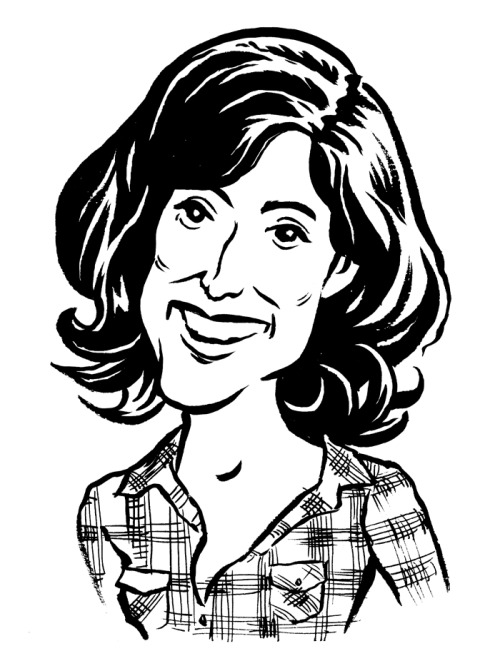
Kate.
Herbivore. San Francisco.
Posh and urbane, raw and naked. Kate Willett’s comedy feels like a Rolodex of folly, flipping past conflicts and complexes, humanizing vulnerable witlessness. A lot of it is inspired by real events—former flames, Burning Man—emotionally processed, polished and performed with a sharp wit, candid reveals, and matter-of-fact sarcasm. And, while she has concise takes on a gamut of topics, from stoner privilege to vision boards, her jokes about sexuality are prominent and undeniable. Willett is as at home deconstructing traditional gender roles in light of millennial aloofness—”I think it would suck to do the old timey gender stuff with some of the men we have right now, like, making someone dinner after their long day as a barista”—as she is honoring her hubris: “I’ve let men inside me that I wouldn’t let inside my apartment.” There’s no pandering, ra-ra, amirite bullshit, all universal appeal comes from internal, personal clarity. Kate doesn’t want to be defined by the tricky stickiness of romantic pursuits, but, she doesn’t shy from it either; she sees it as an opportunity:
“I feel like, and one of the things i really want to express in my comedy is that women are people (and, yeah, it’s obvious women are people). Sometimes I’ll tell jokes to these crowds of guys and I will see it register for them that the women they’re sleeping with and not calling back are human beings. And I try to confront that and give public voice to that experience from a non-victimized place…It’s really important to me to highlight the humanity of the whole situation and to have empathy for myself and people I’ve been involved with.”
Kate delights in uncovering latent ideas, analogies, observations, guffawing at the spoils of banter between bites, spoiling her hair around her fingers, eating curry inexplicably with a fork. Sitting across from Kate Willett feels like sitting across from a star. Sure, Kate’s a star, figuratively, in the midst of a career with exponentially impressive achievements. But also, like a literal star, she’s exudes a focused, concentrated luminescence that’s intimidating to stare into for too long; I try not to go blind.
The Valencia, California native was initially intimidated to do stand-up, opting to pursue comedy’s shi-shi older brother: theatre. Musicals, plays, experimental plays with interpretive dances while strapped to a deployed parachute. While she appreciated emoting in a profound spectrum, and after a rough stint studying theatre, she became disillusioned with “laying on the floor and doing breathing exercises” at a disastrous theater school experience. It also didn’t pay the bills. “I drove back from Chicago to California trying to think what I wanted to do with my life.” Comedy seemed a lot less intimidating than before.
She began telling jokes in San Francisco, garnering giggles from long-lingering ideas and observation. Giggles turned to belly laughs when, to process feelings of emotional turbulence, Kate began speaking candidly about heart-shaped shittiness: “I hate when men look at me like a collection of three holes… because I have four. The hole in my heart,” Willett joked earlier in her career. Kate feels this honesty allows her to connect to others, a skill she looks forward to developing while honoring her trademark frankness. “I feel like a fairly shameless person, which has been a painful thing for me throughout my life, but is a good attribute when it comes to comedy. So I’m glad I finally found a constructive use for that terrible trait.”
Kate is all in, pursuing her craft with loving abandon. She performs more sets than there are days in a year, she produces five shows, such as Comedy at the Convent and The Mission Position, acts and produces short films, writes humorist songs, jet sets across the continent from New York to Montreal. She quit her day job to go on tour with Margaret Cho, her comedy hero since she was 14. They met and hit it off with at Club Deluxe—another show she produces—a night after Comedy Day. “She’s lightyears ahead of me in terms of her career and her stand-up but has also had, at some point in her life, a lot similar experiences to the ones I’m having now.”
She owes her determination and prowess to a desire for readiness. “There so much to learn and there so far to go…I want to be the best comedian I can be [because], one, I love it, but also, if i get a shot at opportunities, I want to do the best that I possibly can be.”
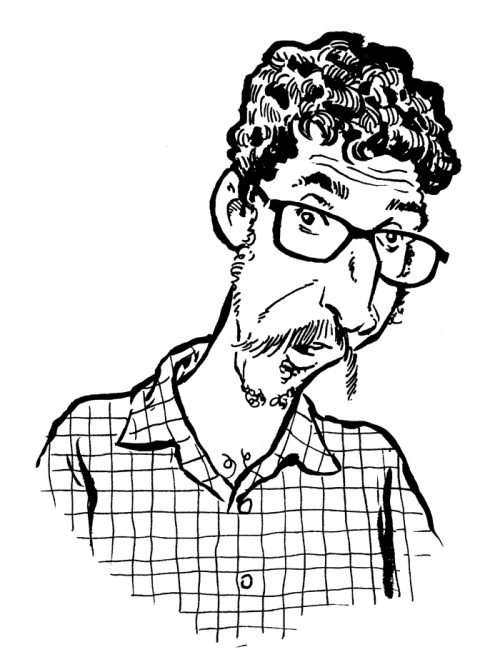
Matt.
Starbucks. San Francisco.
“If we’re doing biopic of your career as a comic so far, where does it start?”
“Where does the biopic start?”
“Yeah, what’s the first scene?”
“I think the first scene is me as an old man. I’m right about to go onstage. [I’m] in the green room and I need to think about my entire life. And then I go out on the stage and it turns out the stage is actually the corner of a tiny bar somewhere. There’s no one in the audience but drunks. I do some jokes, and no one’s laughing. And then I take a gun, and I put it in my mouth, and I go, “Who’s laughing now…?” And then I pull the trigger. [backpeddling] That’s not real! None of that’s how I see it.”
A shoegaze charmer speaking in rambling, meandering patter with self-effacing, neurotic charisma. One part discourse: crafting arguments, mining jokes from exploring multiple angles, entertaining the logic of would-be detractors as puppets for hypotential histrionics, wielding humor to invite a point of view. Another part bombast: overshares in overdrive, wild, guttural splatterings of unexpected darkness, or smut, or absurdity. Fake-fish fucking, penis loathing and time traveling assassins. He’s a millennial everyman, a conduit of emotion, his feelings being the yellow Sun to his unassuming Superman. You end up rooting for Matt Lieb, because, while he’s natural funny, he just seems like he’s so gracious for your laughter, your approval. “[Comedy] keeps me busy. Keeps me from feeling useless, in a way … It’s hard to isolate, hard to hide in yourself, when you have to go out and talk to people… it’s therapeutic in that way.”
Born and raised in West Los Angeles, Matt Lieb, a plucky, awkward youngster, sat in the Laugh Factory on Sunset, sipping $4 sodas, in awe of watching the likes of Bob Marley and Dane Cook whom “absolutely destroyed”. This led to reading The Comedy Bible, “whoever wrote that is a fucking genius, just raking in the cash on people’s dreams that will probably go unrealized”, which lead to writing jokes as a teenager, mostly about how Matt would never get laid and that he hated society—”I knew I didn’t know shit from shit, but what I did know was my feelings, so those where all that mattered”—which lead to attending the quietly infamous stand-up comedy class at UC Santa Cruz (Emily Heller, Mary Van Note, Jesse Elias among its luminaries), which lead to performing stand-up and sketch comedy in college, which lead to… studying to be a teacher in San Francisco?
“Two months into it, I realized teaching wasn’t for me. I realized I was planning all these things around [comedy], [that] once I have this degree, I’ll be able to have a job, and once I have a job, I can make money, and I can feel “okay”, and *then* I can do comedy. And then realized I wouldn’t be able to start comedy until I was 32…”
Matt inherited and internalized financial anxiety from his parents. His father is a neuroscientist turned restaurateur turned teacher, his mother is a law librarian with decades of stability on the books. There were huge fluctuations of economic status, tremendous stress. Imagine how well it went over when Matt dropped out of school and rekindled his relationship with comedy, the financial abyss, in gusto. “My dad said, out of fear, ‘but you’re gonna fail!’” They’ve since come around after witnessing a well-received performance at the Punch Line Sunday Showcase. Matt’s dad has even resorted to pitching his son jokes.
So, how come Matt so funny? It’s something he’s trying to distill: “I ask people all the time, ‘Do I sound funny? Do I look funny? Is it funny because it’s clear that I’m suffering, or is it clear that I’m confident?’ I honestly have know no idea.”
You can try to figure out for yourself. Matt Lieb is an irregular regular on the FilmDrunk Frotcast, has taken down national icon Lebron James, made some of that yogurt money and is a producer of the Tabernacle and the Mission Position. Or you can just see him live, laugh and enjoy yourself, leave the self-conscious existentialism to the rakish goober.
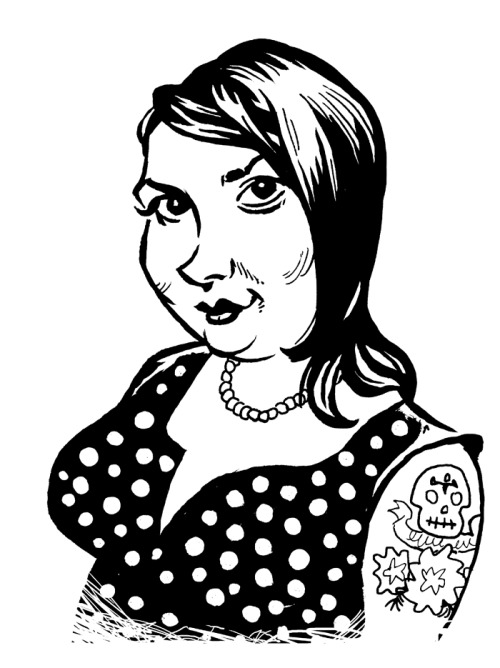
Lydia
A Home. San Francisco.
“Tits and brunch,” answered to the question “which of your bits are people responding to most?”
Tits. A rally cry against baseless entitlement and unchecked mediocrity. It demands effort from the marginalized, who have a legitimate disadvantage, to at least try, to win the game by playing. Tits become a loose cannon vigilante, busting through glass windows or slipping through doors. “I have no time, no time, for unconfident hoes!”
Brunch. A tribute to the lovechild of breakfast and lunch, better than its parents, threatened by infants. Lyrical potency pulsed into a purée. Unctuous inflection simmered into a rue. Imagery plated with artisan craft. Passion glaze. Impersonation garnish. “I’m talking about brunch! I brunch hard!”
Lydia Popovich has standards and makes no apologies for them. Immaculate, impeccable fashion, exquisite, palatable flavors, every piece of media consumed with a curated sense of self, every decision adhering to aesthetics. It’s not pretense or farce, it’s comfort and care. The Lydia you see dressed to the nines and amped to eleven, *is* Lydia. She’s understands that not everyone can live up to her principles, nor does she approve. She probably has the most acute criticism on how you could be better, for instance, in presenting yourself at a show with patrons: “They’re paying to to see you, look like you give a shit.”
Popovich performs with the gift of gab, engaging and loquacious, sharp-tongued and long-lunged. Rather than the stop-and-go of set up, punch, the San Jose native’s sets spread out like roadtrips, the journey as important as the (in)sights. “It’s a gift and a curse. I’m wordy as fuck. Comedy is about economy of words and I start with way too many.”
Her words first found home at Hater Tuesday, Lydia’s blog, in its current state, since 2004. Stories and anecdotes, rants and takes, stretched out with characteristic “get bent” bend. Though the seeds of a comic was there—the first post is entitled “Everyone has opinions… mine are just better.”, I mean, right?—writing wasn’t an immediate lead in to amplifying that voice through microphones. Lydia was used to being backstage, not on it.
Drawn to the event promotions to make all the live shows and booze she was working odd jobs for work for her, Lydia reached out to a listing for an “-of all trades” type for an undisclosed company. She showed enough motivated moxie to land the gig. Turns out it was Quannum Projects, one of Lydia’s favorite hip hop labels at the time. There she embraced the challenge that comes with success. Remember that bouncy, catchy Lyrics Born’s “Callin’ Out” song you’d hear, weirdly, topping the charts at Live 105, the Bay’s alt-rock channel? That was Lydia.
“I walked into Live 105 with a rap record every Thursday, and when that record got on the radio, that record became number one for 18 weeks, because, every fucking Thursday, I sat outside of Aaron Axelson’s office until I got into that room, because I knew he would like it, and I knew it would work. If I was like, “I’m too scared”, or, “I’m embarrassed, none of those things would have happened… I know who I am, I know what I’m capable of, and, also, I’m not afraid to fail.
You can never achieve greatness if you never try.“
Ironically, at this point, there was still no try in stand-up. Despite a fearlessness, possessing a sense of humor and a point of view, loving upbringing of Redd Foxx and Elayne Boosler from her father’s record collection—“I learned to be compelling from my dad”—and bonding with her younger brother at SFSketchfest, performing was never entertained. Comedians are comedians when they’re born. Everyone that has it, always had it, even if they never use it, or don’t nurture it. Some need a push to access that part of them, Popovich needed a push, a drag, a fireman’s carry out of post-breakup hovel of smoke, firewater and episodes of LOST. A lifelong friend, who had done stand-up before, harassed Lydia to do a set at the San Francisco Comedy College, where her friend had been taking classes as last hurrah before fatherhood. “I did it. It was terrifying, I was scared shitless but afterward I was like, ‘Oh! [beat] Oh! [beat] Oh yeah, I’m doing this again.’” Lydia took to it immediately (duh), and inherited the remaining classes, a point flaunted in vindication as Lydia ascends in comedy: “He [said], ‘I fucking told you! … Watch, you’re gonna be better than I was ever was. The only reason I got into stand-up is so you would.’”
The style, the taste, the hate, the bravado, the beginnings, the verbiage, “Tits”, “Brunch”, all reflect assuredly in Popovich’s vision for her comedy. Her goal is entertaining those in the immediate vicinity, the space rich with connection and context, nearly impossible to recreate or recapture. All the excess distraction, from writing for others to dumping work online, all the aspirational career goals comedians are taught to covet, Lydia could do—and does—without. “I don’t give a fuck about being on Pandora or recording my first special. The only thing I want is for people to come see me live, [to] experience, with me, what we created that night.” She understands that not everyone can share her sense of integrity, nor does she approve. She probably hates it, whatever you do that you’re doing disservice to.
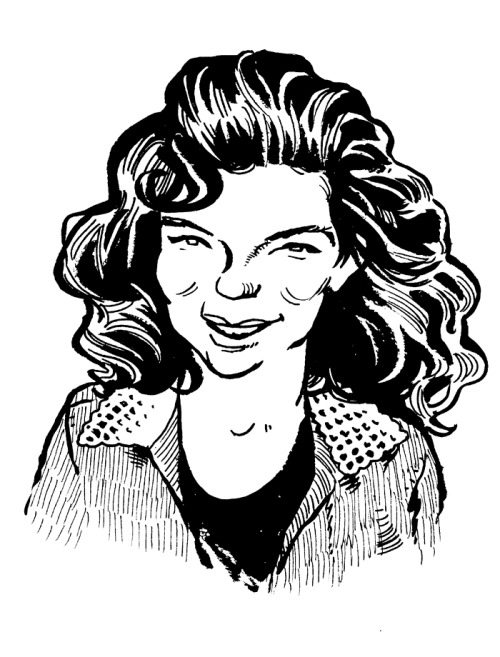
Jessica.
Creek Cafe. San Francisco.
This isn’t Jessica Sele’s first accolade for being funny. She couldn’t enter a competition or school rally without leaving with some award or praise, a People’s Choice award for singing “Don’t Rain on My Parade” standing out among the lauds. There were two choices for her high school yearbook superlative: Most Likely to Be A Stand-Up Comedian and Most Likely to Be A Funny Mom. Jessica chose the former. “No offense to funny moms.”
Jessica is a showtune-loving belter known to launch into “Hellfire” from the Hunchback of Notre Dame—once performed, against her family’s consent, as a child during Thanksgiving dinner—or dropping a few bars in a casual cafe conversation. She’s always felt destined for the bright lights of Broadway (still working on it). Still, the world’s a stage, her stage, and she bounds the boards between interludes of recognized realness, albeit, with less melodies.
“I think that from a young age I felt like I was turning something weird into something positive…[Comedy] is a positive way to express negative emotions.”
Jessica is a comedian. She’s a friend to the plight of animals and has dated the fastest drummer in Oakland. She moved to the Bay in 2011—”It was a good place to be 23”—after graduating from Western Washington University, where she co-founded SUCK, the Stand-Up Comedy Klub. Over the years that I’ve witnessed the jocular Jessica, she’s grown, changed by experience, but has retained lightning-fast response coupled with wondrous weirdness. Many anecdotes are retorts against life’s microagressions, others are parables clamoring against expected mortification. “My ideal performance message is there is dignity in shame and pain…and, also, that the world is ending”.
Comics are often characterized as obtuse, willfully insensitive. “You’re being too sensitive”, “Too PC”. Sensitivity is code for “soft”, which is code for “censored”, which is code for “lying”. A lot of comics distance themselves from it, Jessica embraces it. For Sele, sensitivity isn’t trivial. The same instinct that cautions against external preconceptions and internal pressure also allows for brilliant onstage presence. If there’s something afoot, Sele will suss it out, incorporate the tension and strive to salvage the unease, all in humorous candor, or with silly voices, or in poignant asides. Riffs ripple like capillary waves, stacking in awareness, 4th-wall-breaking while mugging in a mirror, commentary on commentary, pure farm-to-table funny.
And then, across the table, a change. Jokes lower to a simmer. A serious thoughtfulness, interlude of recognized realness. Jessica takes her time between answer and question, collecting thoughts in the distance. She may be complex, contrasted and conflicted, but she won’t be confused, she won’t be misunderstood.
“Definitely I’m a little more focused on personal issues because I’m in my brain all of the time and it’s a crazy experience and I know a lot about it [looks at phone]—recording is weird. But, to be so personal and honest about the crazy things that are going on in my brain, I think is what people are responding to sometimes. I think a lot of people have a lot of intense stuff in their brain that doesn’t come out.”
“Why do you think people hold that shit in?” I inquire.
“People don’t want to seem weird or crazy and I just want to remind them that they are. ‘Cause it’s more fun that way. And I think it’s more humanizing,” Jessica responds.
Sele is capable of speaking so real, so raw, so human, that the room expresses a collective, lizard-brained bellow, an aural explosion to relieve the debilitating truth. Laughter in discomfort lacks comfort. There’s ambivalence in the irreverence. It’s not always obvious. Everything appears fine during the comedian’s references Space Jam, or ebellishes tales of DJing at an lesbian orgy, performer and audiences chuckling synergistically. But, sometimes, Jessica’s face will twist in discomfort, or she’ll voice pain, that the insecurities and traumas she’s expressing are triggered and aching. Sure, all parties are consenting adults, Jessica chooses to joke her way, the audience responds in kind, but I feel complicit in tragedy. It’s a disconcerting, sad subtext that, while Sele is going through such a heaviness, I feel lighter, less burdened (at least for a little while). It’s a remarkable, beautiful emotional ecosystem.
“Recently at the Mission Position [a showcase Jessica Sele co-produces every Thursday at Lost Weekend], an older guy just lost his cat and he said that I made him feel better. That’s something… that’s not nothing… I’m not nothing!”
Jessica Sele is not nothing. She is something else.
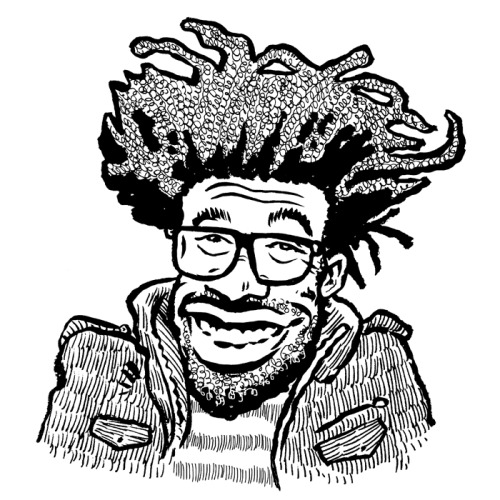
Stroy.
Whole Foods Market. Oakland.
“Yeah, what’s cracking? It’s ya boy Stroy Moyd Dot Com, youknowwhatimsaying. East Oakland representing, we out here, youknowwhatimsaying. My nigga O.J. ain’t do comedy in 3 years; coincidentally, he’s had a girlfriend for the last three years, youknowwhatimsayin. But we out here getting it crackin’, man. Over here drinking coffee, drinking this chamomile. Yeah, you feel me?”
— Stroy Moyd’s first words, without prompting, seconds into recording.
It’s not surprising that East Bay native Stroy Moyd was in The Pack, a skateboarding, young, Black hip hop collective that rose to national prominence in the 2006 hyphy takeover. “Before there was the Pack there was the Heavy Hitters,“ he reflects. “[Of “Vans”] I was there when Young L was making that beat, and I was like, ‘Man, that beat is hella week!’” His departure came from a disagreement, an altercation, to which Stroy was tangentially involved in, more specifically, complicit under familial ties.
“I was the first mothafucka to rock Vans. I still rock Vans to this day.”
There’s a residue of regality in the company of an unofficial mayor of Oakland, a homegrown hero, a local celebrity, a man-about-town that’s also a man-about-the-Town. A sista in line for coffee, greeted and showed love; there is a conversation about work hours. A brotha flying down Telegraph on a skateboard flagged down Stroy’s car; he showed love and discussed buying a new car, converting it into office storage for his decks. Open-air salutations are the product of good, ole fashion community and synergy, and long-time residents have more opportunity to make these connections, still, it feels like Stroy Moyd knows everybody, and everybody knows Stroy Moyd.
At fifteen Stroy found a calling in comedy. His first set was at the Brainwash Cafe, per usual in San Francisco comedy, but his first “set” was at a funeral for a recently deceased grandmother, paying tribute with tales of elderly kleptomania and whoopin’ ass. Moyd’s family was rolling, their laughter reaching out to the streets outside. “I walked 30 people into my grandmother’s funeral.” His follow up at the Brainwash went “horrible”, per usual in San Francisco comedy, but it was already a wrap.
Since then, the comic grinded around the Bay, moved to Los Angeles, moved back, launched the #HellaFunny production brand, developed television show pitches, opened for Tracy Morgan and Hannibal Buress, the later whom, when asked how he knew Stroy, said, “’I know him from the streets.‘” A decade of leaping without looking, getting gassed up, let down, hustling, getting hustled, garnering validation, shining bright, and having fun.
Compellingly savvy and disciplined, Stroy Moyd, who, within a year of living in LA accomplished the no small feat of having concurrent shows at the Hollywood Improv and the Laugh Factory, produces some of the most wildly successful shows in town. Utilizing tech services like Sosh and FunCheapSF, selling out Cobb’s Comedy Club and Greatstar Theater, “and for $75, I can show you for one hour, how to get that shit crackin’!”—Stroy does production consultations, fyi. Not that being a comedy magnate is without pitfalls: long hours of banal, meticulous work, coupled with pressured quality control from scrutinizing customers (once resulting in a hefty refund—two cats, actual felines, parading around the venue, and old school SF no-frills bathrooms were the culprits). “When you got rich people [the usual clientele of Sosh] coming, you can’t have a spot like that.” The biggest casualty of these good fortunes is Stroy’s artistic development, the articulate gravitas and cunning writing that got him on this list. It’s hard to work on new material at premium shows. Rich people aren’t paying for somebody “with a notebook, not giving a fuck” either.
Mechanically, his humor is very quantifiable: neo-classic street jokes, slang and lingo incorporated with authentic authority, punctuated with Internet vernacular. What’s harder to communicate is Stroy’s embodiment of swag, a delivery and demeanor more akin to a rapper with Mustard on the beat (hoe), than a comic. It’s what makes each set compelling, his glibness more expressive, his incendiary comments more tolerable. Stroy Moyd is the only comedian I’ve seen, that appeals to and openly confronts uncontested liberalism, assumed consciousness in Bay Area, not under the guise of a difference of opinion or culture gap, but, rather, a knowing incite against what’s progressive conformity. For instance, he has a piece where he describe a run-in with a “hardcore feminist”, who rebuked the chivalrous advances of Stroy, “a real human being”. You could imagine this not doesn’t go over favorably. The bit is typically topped with a button, an epilogue referencing the previous joke, to which the comic responds, “Well, if you were at home cooking and cleaning like you’re supposed to, you wouldn’t have heard that joke.” The reaction is straight out of 1980s National Wrestling Alliance! Groans, jeers, hisses, rage. Like a professional wrestler, Stroy employes persona and agitation to rile people up, rattle pretension, to make light.
“I don’t want to nobody to take me hella seriously. I don’t even take myself hella seriously. This is all just a game. It’s all just fun.”
There’s a explicit humility in the conversation. The once proclaimed “Prince of Comedy” is very aware of his shortcomings, humble about his magnetism, a student of his craft that’s aspirational about his transcendence. His father, also named Stroy Moyd (i.e. the antonym of “destroy”), did comedy locally in his late teens, early twenties, before exchanging stage time for family time. He’s now a motivational speaker, often providing the younger Stroy with “hella game”, in addition to imploring his son to stick with it, a frustrating sentiment when you’re trying to lick your wounds after the inevitable bomb.
“How close have you been to quitting?” I ask.
“Oh, I ain’t never quitting. And it’s funny, he’s always telling me, “don’t quit”, and I’m like, “Dude, I’m not going to quit. I just had a bad set.”
Father and son’s favorite analogy is of the Chinese bamboo tree. This particular tree takes years of water and care, showing no visible growth, before it emerges. Then, in a short time, it grows exponentially. It just needed to establish it’s roots, and for its environment to nurture with patience and vigilance, which, in comedy, equates to, well, everything Stroy Moyd is committed to. It’s only a matter of time before he erupts.
Quick Links:
Stroy Moyd | Jessica Sele | Lydia Popovich | Kate Willett | Matt Lieb
